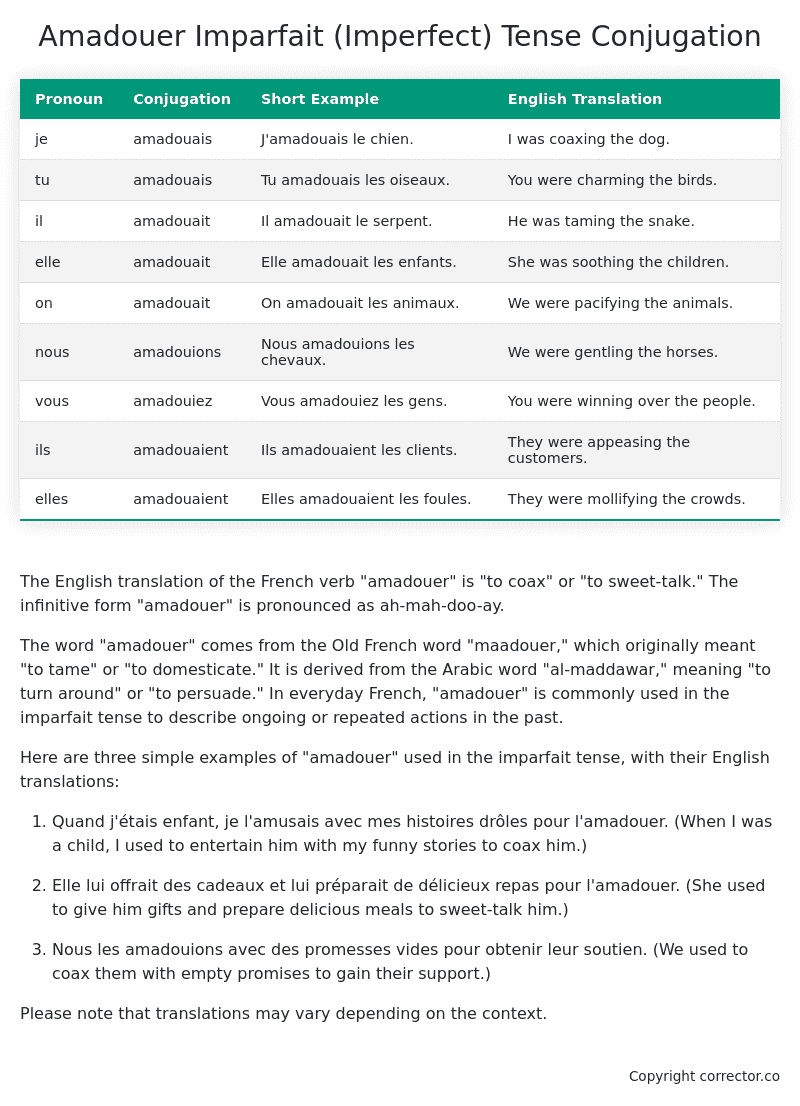Imparfait (Imperfect) Tense Conjugation of the French Verb amadouer
Introduction to the verb amadouer
The English translation of the French verb “amadouer” is “to coax” or “to sweet-talk.” The infinitive form “amadouer” is pronounced as ah-mah-doo-ay.
The word “amadouer” comes from the Old French word “maadouer,” which originally meant “to tame” or “to domesticate.” It is derived from the Arabic word “al-maddawar,” meaning “to turn around” or “to persuade.” In everyday French, “amadouer” is commonly used in the imparfait tense to describe ongoing or repeated actions in the past.
Here are three simple examples of “amadouer” used in the imparfait tense, with their English translations:
-
Quand j’étais enfant, je l’amusais avec mes histoires drôles pour l’amadouer. (When I was a child, I used to entertain him with my funny stories to coax him.)
-
Elle lui offrait des cadeaux et lui préparait de délicieux repas pour l’amadouer. (She used to give him gifts and prepare delicious meals to sweet-talk him.)
-
Nous les amadouions avec des promesses vides pour obtenir leur soutien. (We used to coax them with empty promises to gain their support.)
Please note that translations may vary depending on the context.
Table of the Imparfait (Imperfect) Tense Conjugation of amadouer
| Pronoun | Conjugation | Short Example | English Translation |
|---|---|---|---|
| je | amadouais | J’amadouais le chien. | I was coaxing the dog. |
| tu | amadouais | Tu amadouais les oiseaux. | You were charming the birds. |
| il | amadouait | Il amadouait le serpent. | He was taming the snake. |
| elle | amadouait | Elle amadouait les enfants. | She was soothing the children. |
| on | amadouait | On amadouait les animaux. | We were pacifying the animals. |
| nous | amadouions | Nous amadouions les chevaux. | We were gentling the horses. |
| vous | amadouiez | Vous amadouiez les gens. | You were winning over the people. |
| ils | amadouaient | Ils amadouaient les clients. | They were appeasing the customers. |
| elles | amadouaient | Elles amadouaient les foules. | They were mollifying the crowds. |
Other Conjugations for Amadouer.
Le Present (Present Tense) Conjugation of the French Verb amadouer
Imparfait (Imperfect) Tense Conjugation of the French Verb amadouer (You’re reading it right now!)
Passé Simple (Simple Past) Tense Conjugation of the French Verb amadouer
Passé Composé (Present Perfect) Tense Conjugation of the French Verb amadouer
Futur Simple (Simple Future) Tense Conjugation of the French Verb amadouer
Futur Proche (Near Future) Tense Conjugation of the French Verb amadouer
Plus-que-parfait (Pluperfect) Tense Conjugation of the French Verb amadouer
Passé Antérieur (Past Anterior) Tense Conjugation of the French Verb amadouer
Futur Antérieur (Future Anterior) Tense Conjugation of the French Verb amadouer
Subjonctif Présent (Subjunctive Present) Tense Conjugation of the French Verb amadouer
Subjonctif Passé (Subjunctive Past) Tense Conjugation of the French Verb amadouer
Subjonctif Imparfait (Subjunctive Imperfect) Tense Conjugation of the French Verb amadouer
Subjonctif Plus-que-parfait (Subjunctive Pluperfect) Tense Conjugation of the French Verb amadouer
Conditionnel Présent (Conditional Present) Tense Conjugation of the French Verb amadouer
Conditionnel Passé (Conditional Past) Tense Conjugation of the French Verb amadouer
Conditionnel Passé II (Conditional Past II) Tense Conjugation of the French Verb amadouer
L’impératif Présent (Imperative Present) Tense Conjugation of the French Verb amadouer
L’impératif Passé (Imperative Past) Tense Conjugation of the French Verb amadouer
L’infinitif Présent (Infinitive Present) Tense Conjugation of the French Verb amadouer
L’infinitif Passé (Infinitive Past) Tense Conjugation of the French Verb amadouer
Le Participe Présent (Present Participle) Tense Conjugation of the French Verb amadouer
Le Participe Passé (Past Participle) Tense Conjugation of the French Verb amadouer
Struggling with French verbs or the language in general? Why not use our free French Grammar Checker – no registration required!
Get a FREE Download Study Sheet of this Conjugation 🔥
Simply right click the image below, click “save image” and get your free reference for the amadouer imparfait tense conjugation!

Amadouer – About the French Imparfait Tense
NOTE: To take a deep dive into all the French tenses then see our article on Mastering French Tense Conjugation.
Formation of the Imparfait Tense
For regular -er verbs:
For regular -ir verbs
For regular -re verbs
Common Everyday Usage Patterns
Description of Past Habits
Background Information
Mental and Emotional States
It’s employed to express emotions, thoughts, or physical sensations in the past. For example: “J’étais content quand il est arrivé.” (I was happy when he arrived.)
Ongoing Actions
Points to Note About the Imparfait Tense
Passé Composé vs. Imparfait
Conditional
Si Clauses
Narration
I hope you enjoyed this article on the verb amadouer. Still in a learning mood? Check out another TOTALLY random French verb imparfait conjugation!


